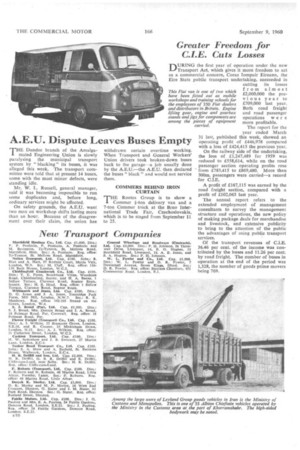Greater Freedom for C.LE. Cuts Losses
Page 68

If you've noticed an error in this article please click here to report it so we can fix it.
This Fiat van is one of two which have been fitted out as mobile workshops and training schools for the employees of 350 Fiat dealers and distributors in Britain. Engine lifting gear, engine and gearbox stands and jigs for components are among the pieces of equipment
DURING the first year of operation under the new 1.-,Transport Act, which gives it more freedom to act as a commercial concern, Coras Tompair Eireann, the Eire State public transport undertaking, succeeded in cutting its losses from almost 12,000,000 the previous year to £709,000 last year. Both road freight and road passenger operations wer e more profitable.
The report for the year ended March 31 last, published this week, showed an operating profit of £446,978 compared with a loss of £424,415 the previous year On the railway side of the undertaking, the loss of £1,247,489 for 1959 was reduced to £558,614, while on the road passenger section operating profits rose from £783,415 to £869,480. More than 300m, passengers were carried—a record for C.I.E.
A profit of £167,115 was earned by the road freight section, compared with a profit of £102,065 last year.
The annual report refers to the extended employment of management consultants to survey the management structure and operations, the new policy of making package deals for merchandise and livestock, and extensive publicity to bring to the attention of the public the advantages of using public transport services.
Of the transport revenues of C.I.E. 36.46 per cent. of the income was contributed by the buses and 11.26 per cent. by road freight. The number of buses in operation at the end of the period was 1,328, the number of goods prime movers being 769.




















































































































































